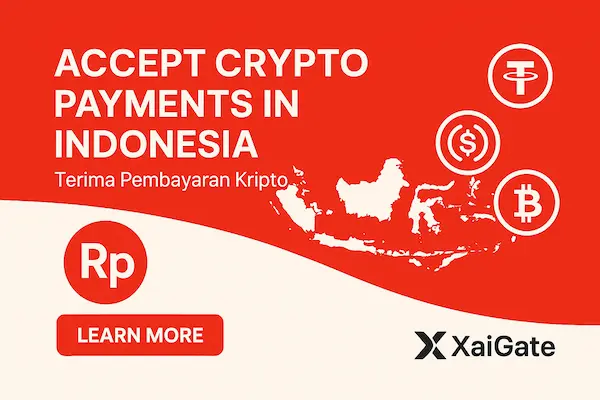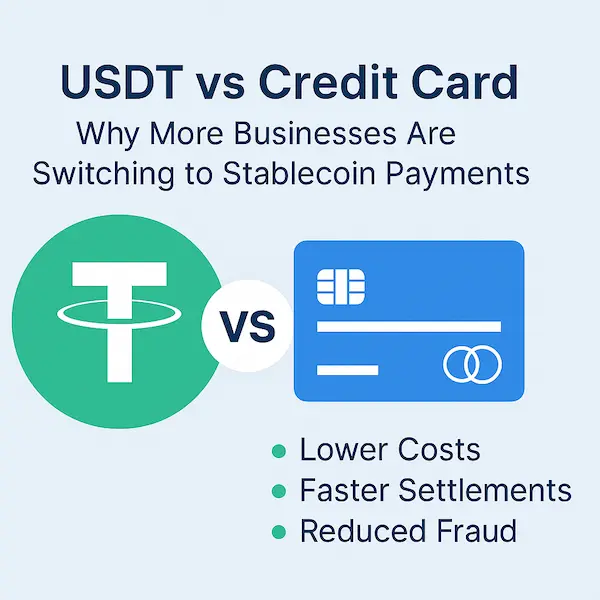Indonesia, the world’s fourth most populous country with nearly 280 million people, is quickly emerging as one of Southeast Asia’s most dynamic crypto markets. From the bustling streets of Jakarta to the tourist hubs of Bali, digital transactions are becoming part of everyday life. Alongside e-wallets and QR payments, crypto is quietly stepping into the spotlight.
For local businesses, the ability to accept crypto payments in Indonesia is no longer just a trendy option—it’s a smart business strategy. Tourists, international clients, and even tech-savvy locals are looking for faster, cheaper, and borderless payment methods. Stablecoins such as USDT, USDC, and PYUSD have made it even easier by reducing volatility risks while ensuring payments remain instant and secure.
At the same time, Indonesia’s regulators, particularly Bappebti and the OJK, are introducing frameworks that encourage innovation while protecting consumers. This balance of opportunity and oversight makes Indonesia one of the most promising markets for crypto adoption in 2026.
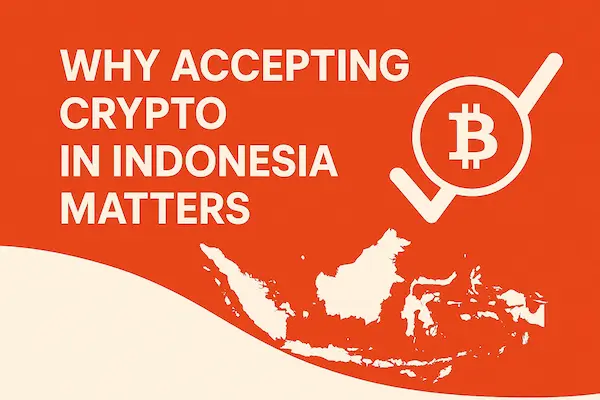
Contents
- 1 1. Why Businesses Should Accept Crypto Payments in Indonesia
- 2 2. How to Accept Crypto Payments in Indonesia (Step-by-Step Guide)
- 3 3. Top Industries Adopting Crypto Payments in Indonesia
- 4 4. Benefits of Accepting Crypto in Indonesia
- 5 5. Challenges & Compliance Considerations
- 6 6. Case Studies – Crypto Adoption in Indonesia
- 7 7. Future of Crypto Payments in Indonesia (2026 & Beyond)
- 8 FAQs – Accepting Crypto Payments in Indonesia
- 9 Conclusion – Why Accepting Crypto in Indonesia Matters in 2026
1. Why Businesses Should Accept Crypto Payments in Indonesia
Indonesia is one of the fastest-growing digital economies in the world, and consumer habits are shifting rapidly. More than half of the population is under the age of 35, and this younger generation is open to alternative payment options that go beyond traditional banking. For businesses, the decision to accept crypto payments in Indonesia can unlock new revenue streams and attract both local and international customers.
One of the strongest reasons is cost efficiency. Credit card fees in Indonesia typically range from 2% to 4%, while crypto payment gateways often charge less than 1.5%. For SMEs, restaurants, or e-commerce shops, this difference has a big impact on profit margins.
Another advantage is borderless access. Millions of tourists visit Indonesia every year—particularly Bali, Lombok, and Jakarta—and many prefer paying with USDT or other stablecoins instead of exchanging cash into Rupiah. By accepting crypto, businesses can tap into this global customer base without worrying about currency conversions or delays.
Finally, the growing popularity of stablecoins such as USDT, USDC, and PYUSD makes crypto payments more practical than ever. These digital assets are designed to maintain price stability, which eliminates the volatility concerns that businesses once had when dealing with Bitcoin or Ethereum.
In short, adopting crypto payments today positions businesses at the center of Indonesia’s financial transformation, ensuring they remain competitive in 2026 and beyond.
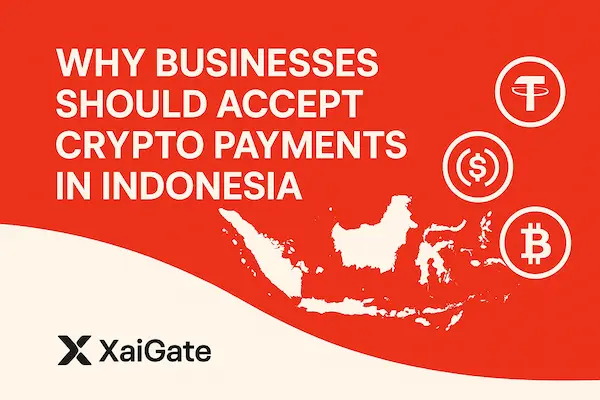
2. How to Accept Crypto Payments in Indonesia (Step-by-Step Guide)
Getting started with crypto payments may sound complicated, but in reality it follows a clear, structured process. Here’s how businesses in Indonesia can set up their systems step by step.
1. Choose a Reliable Crypto Payment Gateway
The first step is selecting a payment gateway that supports multiple cryptocurrencies, especially stablecoins like USDT and USDC, since they are the most widely used in Indonesia. A good gateway should offer low fees (usually around 0.5–1.5%), high security, and automatic conversion to Rupiah (IDR) if needed. This ensures your business can accept crypto payments in Indonesia without unnecessary risk or technical barriers.
2. Set Up Your Business Wallet
Every business needs a wallet to receive payments. You can choose between a custodial wallet (managed by a service provider) or a non-custodial wallet (where you control your own private keys). Many Indonesian merchants prefer non-custodial wallets for maximum control, while others use custodial options for convenience. Security features such as multi-signature authentication are strongly recommended.
3. Integrate with Website, POS, or Mobile App
Integration is straightforward thanks to ready-made plugins for platforms like Shopify, WooCommerce, and Magento. For offline businesses such as cafés, restaurants, or hotels, QR code payment options are highly effective since Indonesians are already familiar with QR transactions. By adding a QR code linked to your wallet, you can start receiving crypto instantly.
4. Ensure Compliance with Bappebti & OJK Regulations
Indonesia’s regulators, particularly Bappebti (for digital assets) and the OJK (for financial services), require businesses to remain compliant. While regular merchants don’t need a special license, exchanges and custodians do. To stay safe, always keep proper transaction records and declare any taxable income from crypto.
5. Accept Payments and Convert to Rupiah (IDR)
Once everything is set up, customers can pay in crypto, and you can choose whether to keep it in your wallet or convert it into Rupiah. Many gateways in Indonesia now provide instant IDR conversion, transferring funds directly into your local bank account. This flexibility makes crypto payments as seamless as card or e-wallet transactions.
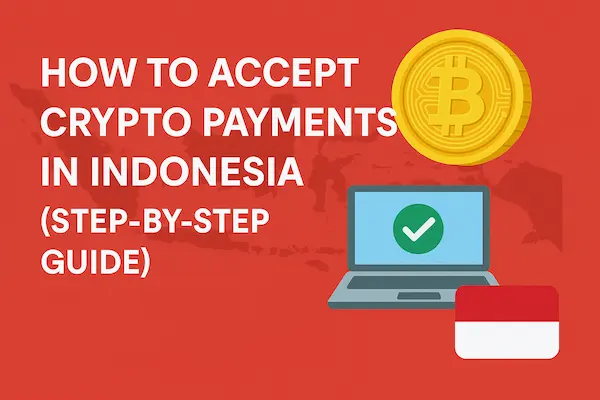
3. Top Industries Adopting Crypto Payments in Indonesia
The movement to accept crypto payments in Indonesia is not limited to one sector—it’s spreading across industries. From tourism to online gaming, different types of businesses are finding unique benefits in adopting digital currencies.
1. Tourism & Hospitality
Tourism is a cornerstone of Indonesia’s economy, with Bali, Jakarta, and Yogyakarta attracting millions of international visitors each year. Many travelers prefer to pay with USDT or USDC instead of exchanging cash into Rupiah. Hotels, villas, and tour agencies that accept crypto not only gain convenience but also stand out as modern, global-friendly businesses.
2. E-commerce & Online Retail
Indonesia’s e-commerce market is booming, with platforms like Tokopedia and Shopee leading the way. For smaller merchants on these platforms, crypto payments provide a way to serve international customers who may not have access to Indonesian banking channels. Accepting crypto helps sellers expand their reach beyond local borders.
3. Gaming & Esports
Indonesia has one of the largest gaming communities in Asia. In-game purchases, tournament fees, and esports sponsorships are increasingly being supported by stablecoin payments. Since crypto transactions are instant and borderless, gamers can easily participate in events or purchase digital goods without friction.
4. NGOs & Charities
Non-profit organizations and charities operating in Indonesia are also embracing crypto donations. These payments are transparent, traceable, and borderless, allowing NGOs to collect support from donors worldwide without worrying about expensive bank fees or delays.
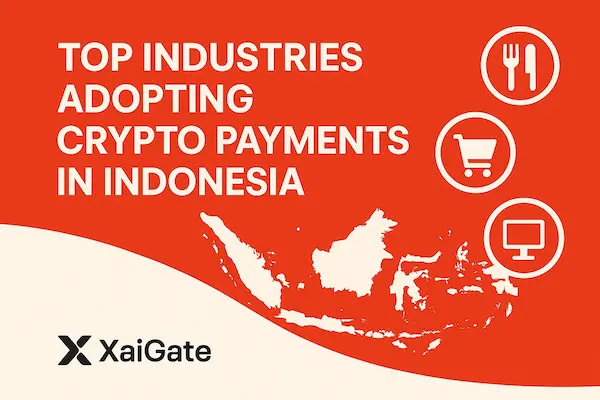
4. Benefits of Accepting Crypto in Indonesia
For businesses across Indonesia, the advantages of embracing digital assets go far beyond hype. Choosing to accept crypto payments in Indonesia can bring tangible financial and operational benefits that strengthen competitiveness in a digital-first economy.
1. Lower Transaction Fees
Traditional payment methods, such as credit cards, often come with processing fees of 2–4%. By contrast, crypto payment gateways typically charge between 0.5% and 1.5%. For a business processing hundreds of transactions a day, these savings directly improve profit margins.
2. No Chargebacks or Fraud
One of the biggest frustrations for merchants is chargeback fraud—when customers dispute legitimate purchases. With crypto transactions, payments are irreversible, protecting businesses from costly disputes and fraudulent claims.
3. Faster Global Transactions
Bank transfers can take days to settle, especially for international payments. Crypto transactions, however, clear in minutes, 24/7. For exporters, freelancers, and e-commerce sellers in Indonesia, this speed is a game-changer, making it easier to serve clients worldwide.
4. Access to a Growing Customer Base
Indonesia is home to one of the world’s youngest populations, with high adoption of digital wallets and alternative payments. By offering crypto as an option, businesses position themselves as modern, customer-friendly, and ready to serve both tech-savvy locals and global visitors.
5. Stablecoin Advantage
Stablecoins such as USDT, USDC, and PYUSD eliminate the volatility issue that once discouraged merchants. This gives businesses confidence to accept crypto payments without worrying about sudden price swings.
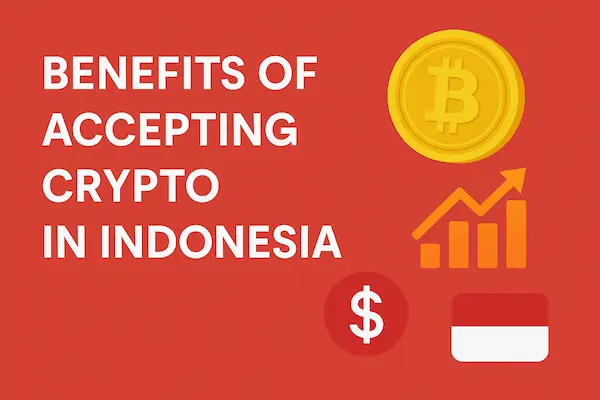
5. Challenges & Compliance Considerations
While the benefits of adopting crypto are clear, businesses in Indonesia also need to be aware of the challenges. To accept crypto payments in Indonesia effectively, it’s essential to understand the risks and legal requirements that come with this new financial model.
Regulatory Uncertainty
Indonesia’s crypto industry is regulated by Bappebti, but oversight continues to evolve. The government has signaled stronger monitoring under the OJK (Financial Services Authority), which means rules may tighten in the coming years. Merchants should stay updated on new regulations to avoid penalties.
Volatility of Non-Stablecoins
Bitcoin and Ethereum remain popular for payments but are highly volatile. A business accepting crypto one day may find the value has dropped by the next. This is why many Indonesian merchants rely on stablecoins such as USDT and USDC to reduce financial risk.
Taxation & Reporting
Although individuals and businesses can legally transact with crypto, profits are taxable. Merchants need proper bookkeeping to declare earnings, especially if converting crypto into Rupiah. Without clear reporting, companies risk tax complications.
Customer Education
Another challenge is that not all customers are familiar with crypto payments. Businesses may need to educate buyers about how to scan a QR code, send stablecoins, or confirm transactions before adoption becomes widespread.
6. Case Studies – Crypto Adoption in Indonesia
The shift to accept crypto payments in Indonesia is already visible in different parts of the country. Real-world examples show how businesses, from small shops to international hotels, are turning digital assets into a practical tool for growth.
1. Bali Resorts Welcoming Global Tourists
Bali, the heart of Indonesia’s tourism industry, attracts millions of international visitors each year. Some resorts and villas now accept USDT and USDC for bookings, making it easier for travelers to pay without converting cash into Rupiah. This simple option not only increases convenience but also positions these resorts as forward-thinking brands that cater to global guests.
2. SMEs Expanding Across Borders
Small and medium-sized enterprises in Jakarta and Surabaya are adopting crypto to reach customers in Malaysia, Singapore, and beyond. By offering crypto checkout on their websites, these businesses eliminate banking restrictions and reduce cross-border transfer costs. For exporters and online retailers, crypto payments open doors to new markets without complex financial arrangements.
3. Fintech Startups Leading the Way
Indonesia’s vibrant startup ecosystem is another driver of adoption. Several fintech platforms are already integrating stablecoin payments into their services, providing merchants with tools to receive funds instantly and securely. These solutions often include direct Rupiah conversion, helping businesses manage both local and international customers.
7. Future of Crypto Payments in Indonesia (2026 & Beyond)
Looking ahead, the momentum to accept crypto payments in Indonesia is only expected to accelerate. Several factors are shaping the landscape for 2026 and beyond.
Strengthened Regulation
The Indonesian government, through Bappebti and the OJK, is taking steps to provide clearer guidelines for digital asset usage. These efforts are designed to protect consumers, reduce fraud, and build trust in the system. A stronger regulatory framework will encourage more businesses to integrate crypto without fear of legal uncertainty.
Rise of Stablecoins
Stablecoins such as USDT, USDC, and PYUSD are becoming the backbone of crypto payments in Southeast Asia. Their stability makes them ideal for everyday transactions, and Indonesian merchants are expected to adopt them more widely. As stablecoin use grows, businesses will find it easier to manage cash flow and minimize volatility risks.
Integration with CBDC (Rupiah Digital)
Indonesia is exploring its own central bank digital currency, the Rupiah Digital. If launched, it could coexist with stablecoins, creating a hybrid ecosystem where businesses accept both state-backed digital currency and private crypto assets. This development would further normalize crypto in everyday commerce.
Expanding Adoption in Tourism & E-Commerce
With millions of tourists returning post-pandemic and a booming e-commerce sector, crypto is set to become a mainstream payment method. Merchants who adapt early will capture the attention of global visitors and digital-first consumers who prefer modern, borderless solutions.
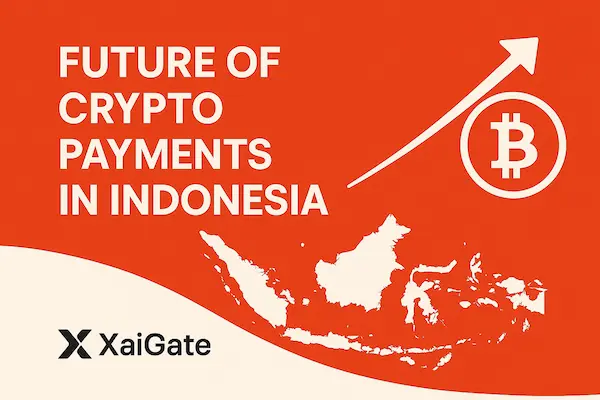
FAQs – Accepting Crypto Payments in Indonesia
1. Is it legal to accept crypto payments in Indonesia?
Yes. Businesses are allowed to accept crypto under Bappebti’s digital asset regulations. While crypto is not classified as legal tender, it is recognized as a tradable asset, making it legal for merchants to use it as a form of payment.
2. What is the best crypto for payments in Indonesia?
Stablecoins like USDT, USDC, and PYUSD are the most practical choices. They maintain stable value, making them ideal for everyday transactions compared to volatile coins like Bitcoin.
3. Do I need a special license to accept crypto as a merchant?
Most merchants do not need a license. However, exchanges and custodial wallet providers must register with Bappebti. Merchants only need to ensure proper bookkeeping and tax compliance.
4. How can I convert crypto into Rupiah (IDR)?
Many crypto payment gateways in Indonesia offer instant IDR conversion. This allows funds to be deposited directly into your local bank account without volatility risks.
5. Are crypto transactions cheaper than traditional payments?
Yes. While credit card fees often reach 2–4%, crypto payment gateways usually charge between 0.5% and 1.5%, saving businesses significant costs.
6. Can tourists use crypto to pay in Indonesia?
Absolutely. Bali and other tourist hubs already accept stablecoins for hotels, tours, and rentals. Tourists prefer paying with USDT or USDC rather than exchanging foreign currency into Rupiah.
7. What risks should businesses consider?
The main risks are volatility (if using Bitcoin/Ethereum), evolving regulations, and tax reporting obligations. Using stablecoins helps minimize these risks.
8. How long do crypto transactions take to settle?
Most payments are confirmed within minutes, compared to hours or days for bank transfers. This speed benefits both businesses and customers.
9. Can SMEs in Indonesia adopt crypto payments?
Yes. Small and medium-sized businesses are already using crypto to sell products online, export goods, and receive cross-border payments without expensive bank fees.
10. What is the future of crypto in Indonesia?
Crypto adoption is expected to grow significantly in 2026 and beyond, driven by stablecoins, government-backed Rupiah Digital (CBDC), and stronger regulations that increase trust and security.
Conclusion – Why Accepting Crypto in Indonesia Matters in 2026
Indonesia is moving fast toward a digital-first economy, and crypto is becoming part of that story. From Bali’s hotels to Jakarta’s e-commerce platforms, businesses that accept crypto payments in Indonesia are already seeing lower costs, faster settlements, and a growing international customer base.
At the same time, regulators like Bappebti and the OJK are shaping clear frameworks to build trust and protect both merchants and consumers. This balance between innovation and regulation is what makes 2026 a turning point: businesses that move early can establish themselves as leaders in a rapidly evolving market.
The adoption of stablecoins such as USDT, USDC, and PYUSD, alongside the upcoming Rupiah Digital (CBDC), shows that crypto is not just an alternative—it is becoming an essential part of global commerce. For Indonesian businesses, this is more than a payment method; it is a chance to future-proof operations and stay ahead of competitors.
Quick Summary Table
| Factor | Insight for Businesses |
|---|---|
| Legal Status | Crypto recognized as tradable assets by Bappebti |
| Best Options | Stablecoins (USDT, USDC, DAI, PYUSD) for stability |
| Main Benefits | Lower fees, faster transactions, no chargebacks |
| Industries Leading | Tourism, e-commerce, gaming, NGOs |
| Future Outlook | Growth in 2026, driven by stablecoins & Rupiah Digital |
Ready to take your business to the next level? Start accepting crypto payments in Indonesia with XaiGate – the secure, fast, and compliant crypto payment gateway built for global businesses. With low fees, instant IDR conversion, and stablecoin support, XaiGate helps you stay ahead in 2026 and beyond.
For daily updates, subscribe to XAIGATE’s blog!
We may also be found on GitHub, and X (@mxaigate)! Follow us!

